Tag: Full-time MBA
Emmy-winning journalist Diane Dwyer and astronaut Soyeon Yi named commencement speakers
South Korea’s first astronaut, Soyeon Yi, MBA 14, and Emmy award winning former broadcast journalist Diane Dwyer, BS 87, will serve as commencement speakers this May.
Yi will speak at the Full-time and Evening & Weekend MBA commencements and Dwyer will speak at undergraduate commencement.
This year, commencement celebrations will be held virtually. The MBA commencement will take place Friday, May 21, 2021 and the undergraduate commencement will take place Saturday, May 15, 2021. Commencement celebration videos for undergraduate, Evening & Weekend, and Full-time MBA celebrations can be viewed online via Marching Order, an online platform used to host UC Berkeley’s virtual graduations.
“We’re so pleased to welcome two inspiring alumnae to address our soon-to-be graduates,” said Haas Dean Ann Harrison. “Soyeon and Diane reflect the very best of Haas and truly embody our Defining Leadership Principles.”
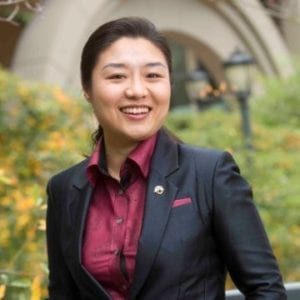
Before coming to Berkeley, Yi spent 10 days at the International Space Station in 2008, making her South Korea’s first astronaut.
Six years after her space mission, Yi decided to add a Berkeley MBA to her PhD in biosystems. Currently, she leads customer engagement at startup ProtoPie and works with Silicon Valley satellite startup Loft Orbital Solutions.
Yi has lectured at the University of Washington and was recently selected to join the Karman Project 2021 Fellowship Program, which aims to foster trust and encourage collaboration among global leaders who want to positively impact space-related initiatives.
Dwyer worked as a broadcast journalist for 25 years, reporting important stories that range from the inauguration of President Bill Clinton to the Oakland Hills Firestorm.
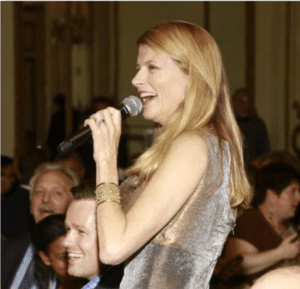 She started her career as an anchor and reporter at KXLF in Butte, Mont. in 1988. She joined the KTVU-Channel 2 newsroom two years later, where she launched and co-hosted the Morning Show with Ross McGowan for several years.
She started her career as an anchor and reporter at KXLF in Butte, Mont. in 1988. She joined the KTVU-Channel 2 newsroom two years later, where she launched and co-hosted the Morning Show with Ross McGowan for several years.
Thereafter, she became the solo weekend news anchor for NBC Bay Area. Her reporting won her two Emmy awards and prestigious awards from the Associated Press and the National Academy of Radio and Television Artists.
Dwyer is a professional faculty member at Haas who teaches a course called Innovations in Communications and Public Relations and currently runs her own consulting business, Dwyer Media Consulting.
Berkeley Haas startup founders raise record funding
A sustainable, space-saving vertical strawberry farm that produces ultra-sweet berries without pesticides and an online bank for “free thinkers, rebels, and entrepreneurs” were among the new companies that propelled Berkeley Haas to No. 4 for fundraising on the Poets & Quants Top 100 MBA startups list this year.
Annually, Poets & Quants ranks b-school startups with at least $5.5 million or more in funding. To be considered, founders must have launched their startups within the five prior years (2015-2020) and have at least one founder enrolled in an MBA program within that time frame.
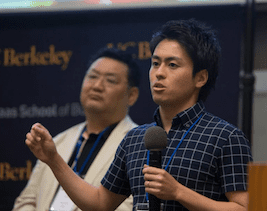
This year, five Haas companies founded in that period raised a record total of $125 million. Two Haas startups made it into the Top 20, including Oishii, founded by Hiroki Koga, MBA 17, ($50 million) and Oxygen, founded by Hussein Ahmed, EMBA 18, ($33 million).
Also on the list were Kyte, a car-sharing startup co-founded by Ludwig Schoenack, MBA 19, ($18 million); Time by Ping, a timekeeping automation company co-founded by Kourosh Zamanizadeh, EWMBA 18, ($17.3 million); and healthcare startup Twentyeight Health, cofounded by Amy Fan, MBA/MPH 19, ($6.08 million). Twentyeight Health also made Poets & Quants’ 2020 “Most Disruptive Startups” list.
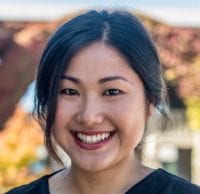
Stanford, Harvard, and Columbia Business School had seven startups on the 2021 list, while Haas, the University of Pennsylvania’s Wharton School, and France’s INSEAD all had five.
“We’re so proud of what these startup founders have accomplished,” said Rhonda Shrader, executive director of the Berkeley Haas Entrepreneurship Program, noting that founders from four MBA degree programs–full-time MBA, evening & weekend MBA, MBA/MPH, and executive MBA—are represented on the P&Q list. “Their ongoing success is proof of the depth and breadth of our entrepreneurship programs across campus, and a testament to the drive that so many of our students have to build world-changing startups.”
More proof of that drive came this week as Ryan McQuaid, MBA 08, announced that he’d sold his startup, virtual primary care platform Plushcare, to Accolade for $450 million. McQuaid, who started Plushcare at Haas, made previous Poets & Quants Top MBA startup lists.
Entrepreneurship is one of Dean Ann Harrison’s top three priorities for the school, and Haas continues to invest in new resources, recently announcing three new professors in its Entrepreneurship & Innovation group and a plan to build a new entrepreneurship hub on campus. “It’s gratifying to see so many Haas founders on this list who are solving important problems that impact everything from the environment to healthcare,” Harrison said.
Validating the business model

Jersey City-based Oishii, ranked No. 14 on the list, runs a vertical farming operation, raising top-quality strawberries that are tested to ensure two to three times the sweetness of conventional berries.
Founder Koga arrived at Haas in 2015 after working as a consultant in the vertical farm industry in Japan. Realizing that agriculture was no longer sustainable, he decided to tackle the problem by growing crops indoors, which allowed him to use 90% less land and water, eliminate the use of pesticides, and cut down on food transportation distances.
The MBA program provided two years to assess his hypothesis and validate the business model in the U.S., something he said he could never have done from Japan. During Koga’s second year, he entered the LAUNCH accelerator program—and won the competition, “which gave us more credibility and recognition as we were raising our seed round.”
Oishii’s strawberries, coveted by chefs, sold out pre-pandemic, Koga said. But as more people started cooking at home over the past year, they became increasingly aware of what they were eating and more willing to pay for higher-quality produce. As a result, many vertical farm companies have grown quickly and experienced a significant increase in revenue and funding, Koga said.
Filling in missing pieces
Startup Oxygen, No. 19 on the P&Q list, offers banking to freelancers, consumers, and small businesses, with no monthly fees, marketing itself as a new kind of bank account for “free thinkers, rebels, and entrepreneurs.”
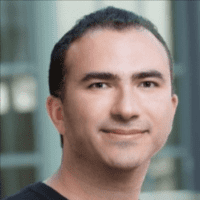
Ahmed said he founded Oxygen out of personal experiences with banks. “Living for a big part of my life as a “solopreneur,” consultant, and business owner, it was always a struggle to work with banks and financial institutions because I didn’t fit the typical molds they have—either a 9-to-5 full-time employee or a corporation—nothing in between,” he said.
The pandemic, while horrible, was “a blessing in disguise” for Oxygen, he said. With stay-at-home orders, digital banking suddenly became the only way to bank “without having to drive down to a branch and wait in line masked up,” he said. There was also a massive boom in new business formations in the U.S., which significantly accelerated Oxygen’s small-business banking growth.
Ahmed, who has an engineering background and started companies before he arrived at Haas, said the MBA program helped fill in missing pieces.
“With an engineering background and product focus, along with scars and wins and street smarts, I was still missing the academics and business tactics from economics, finance, and accounting,” he said. “Having those subjects, great professors, and class discussions gives a lot of perspective on how to think about all those different angles and perspectives—while being at the helm dealing with everything on a day-to-day basis.”
Startup 60Hertz wins Invest for Impact Competition
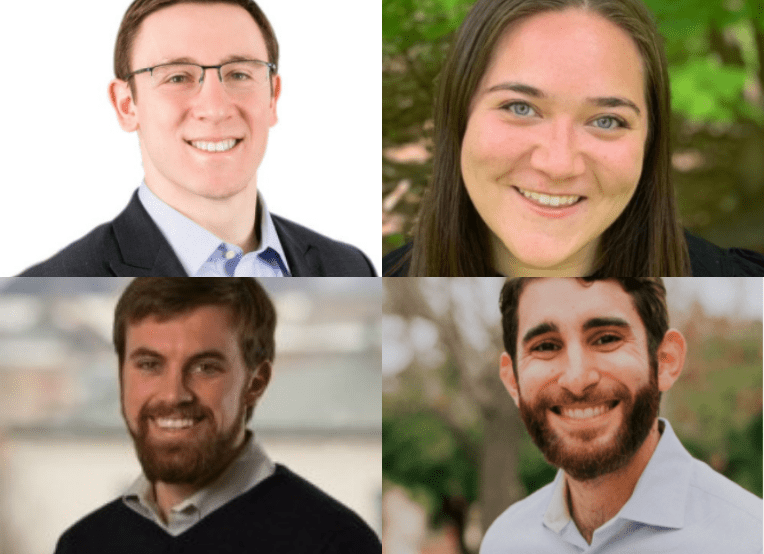
Software that can help electricity operators monitor and maintain microgrids located in remote rural communities netted a first place win and $50,000 in funding at the second annual Invest for Impact Competition. The event was held virtually April 23.
The winning student team–Jack Kerby-Miller, Simon Greenberg, both MBA 21, Rachel Stinebaugh, and Michael Calderón, both MBA 22–secured equity investment for early-stage startup 60Hertz.
“I am absolutely thrilled we were able to fund a women-founded startup that is working to support remote communities, many of which are indigenous communities in Alaska,” Calderón said. “I also feel deeply honored to have worked with my teammates who all brought their expertise and experience to deliver a winning pitch.”
Rachel Stinebaugh, MBA 22, who previously worked with microgrid startups in Burundi before coming to Haas, said 60Hertz was a great fit for the Haas Impact Fund and “well-positioned to address rural electrification in Alaska and other remote locations.”
Five student teams consisting of a total of 20 first-and-second-year MBA students pitched ideas ranging from an online childcare marketplace to a fintech app that would help unbanked communities gain access to credit to a bluetooth-enabled sensor to better track packages.
The competition is the culmination of a course called the Haas Impact Fund in which Haas student venture partners find existing social impact startups and help pitch their innovations to secure equity investment. Many of the startups that are selected for the Haas Impact Fund are in housing development, health, renewable energy, sustainable services and supply chain, and financial access industries.
“I’m incredibly proud of all the students who presented,” said Julia Sze who co-led the course with Bulbul Gupta, both of whom are professional faculty members at Haas. “This course provides a real and exciting opportunity for our students to learn how to invest in early-stage companies that are ready to have a big impact on the world.”
Competition attendees also heard from keynote speaker and UC Berkeley alum Kesha Cash, general partner of Impact America Fund, who gave a talk about the importance of investing in social impact companies to create positive, long-lasting change.
Poshmark’s Manish Chandra, EWMBA 95, on how clothing creates community
As CEO of Poshmark, Manish Chandra, EWMBA 95, constantly questions how and why people shop, and the journey clothing takes from the supply chain to closets to resale.
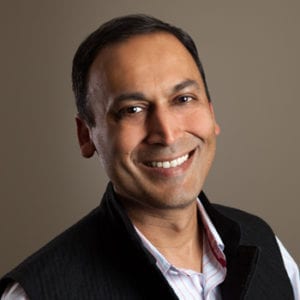
A decade after he graduated from the evening & weekend MBA program, he started the pioneering social shopping platform Kaboodle, which he sold to Hearst two years later in 2007. Poshmark, a social marketplace for new and used clothing and accessories that he founded in 2011, focuses largely on extending the life cycle of clothing.
In a Dean’s Speaker Series event on April 9, MBA students and Robert Strand, executive director of the Center for Responsible Business at Haas, interviewed Chandra about how he embeds sustainability into the core of his business, his journey as a leader, and his vision for the future of capitalism.
Here are a few highlights from the interview.
On the meaning of clothing: “Clothing really binds people together. It brings a sense of community, it empowers people, it makes people feel good, proud. It can uplift people.”
On Poshmark’s rise in popularity during the COVID-19 pandemic: “Covid 19 was a seismic shock and a very sad shock for all of us. We’re still reeling from it. We’re isolated and we’re not physically connected. The circular economy and the resale really was in many ways a connector. When you bought and sold things from each other it connected you to another human being. It gave you something that was very powerful, that took energy to do. We saw the rise of second hand.”
On capitalism in the post-pandemic world: “We’re at a very powerful moment in our history…As we come out of hiding places and the world reintegrates over the next few months, I feel like everyone is looking at their life and looking at their values in a very different way. And as we go out and truly experience both the wonder of human connection and the misery that people have had, it’s a really important time to transform how we feel about consumption, how we feel about capitalism, and how we feel about sustainability. I think all three things can exist in a meaningful way.”
On getting an MBA: “Haas is, for me, one of the most transformational experiences, particularly because it happened after I’d worked for a few years and I was looking at finding that next level of growth for me.”
Watch the full interview:
Startup Spotlight: Lastbit’s plan to revolutionize cross-border payments
Startup Spotlight profiles startups founded by current Berkeley Haas students or recent alumni.
Lastbit
Co-founders: Bernardo Magnani, MBA 20, and Prashanth Balasubramanian

Economist and former McKinsey consultant Bernardo Magnani, MBA 20, spends a lot of time thinking about the meaning of money and how it regulates societies and human behavior. That fascination—and a drive to shake up the international payment industry— led him to early bitcoin user Prashanth Balasubramanian, and fintech startup Lastbit. In this interview, he discusses how he fell into entrepreneurship at Haas and wound up making it into the prestigious Y Combinator accelerator.
What does your startup do (in about 20 words)?
Lastbit is building a payment platform to enable cheap and instant cross-border settlements leveraging the Bitcoin Lightning Network
How did you get started in entrepreneurship at Haas?
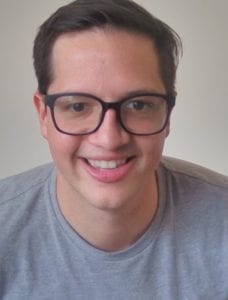
When I came to Haas, I didn’t really know I wanted to be an entrepreneur. I didn’t even take a single entrepreneurship-related course during my MBA program. Nevertheless, I was very clear about the fact that I wanted to work close to financial institutions and payments.
I came to business school sponsored by McKinsey, and despite the fact that my experience with the consulting firm was very positive, I was having doubts about whether it was the right platform for me to drive change.
During my summer internship, I worked for one of the biggest financial institutions in South America, looking for an alternative path. I had a beautiful experience, leading three teams and nine people in digital transformation initiatives. But again, I didn’t feel that was my path. I wanted to do more things, faster.
Following my intuition, I came back to Haas determined to explore entrepreneurship. I reached out to Santiago Pezzoni, Santiago Freyria, and Francesco Dipierro, co-founders of StEP, who are now dear friends. I had heard amazing things about the program and felt that joining a rising project at the heart of the business school was the best way to learn. Eventually, I became part of StEP’s leadership team and fell in love with entrepreneurship.
Where did you meet your co-founder Prashanth Balasubramanian?
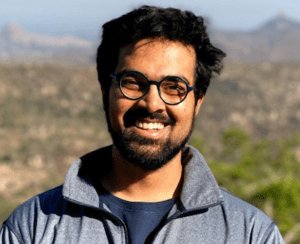
After joining StEP, I knew I wanted to find an opportunity with a fintech startup. I first heard about Lastbit and Prashanth through SkyDeck. I read everything I could find online about Prashanth and his project. I immediately felt connected to his story, values, mission, and even his love for heavy metal music. I had to meet him.
Intending to meet him, I went to my first and last networking event of my MBA. He was not there. I was bummed. Eventually, I found him and we started working together almost immediately. I never looked back after that.
Today, I’m very proud of our partnership and feel that we complement each other perfectly. On paper, we have pretty much no overlap and very different backgrounds, but our drive, vision, and values are pretty much the same.
Where did the idea for Lastbit come from?
Prashanth decided to start Lastbit when he was studying for his Master’s in Computer Science at ETH Zurich. While in Switzerland, he faced a lot of challenges moving money from India to pay his tuition and eventually decided to use Bitcoin.
Despite its potential, Prashanth realized that Bitcoin was still very far from delivering on its promise of being a new viable monetary system. Transactions were too slow and expensive, and using Bitcoin for real-world transactions was close to impossible. He decided to leave his Master’s program to start Lastbit with the mission to take Bitcoin mainstream, leveraging the Lightning Network, a technology that makes sending as little as a dollar instantly across the globe economically viable.
Why did the idea appeal to you personally?
Growing up in Mexico I saw how broken financial services are and I’ve been trying to find a way to solve this. When I met Prashanth, I immediately understood what cryptocurrencies such as Bitcoin could mean for financial services. I’ve worked close to banks for around seven years and had never seen something nearly as exciting. I believe cryptocurrencies are the only credible promise to drive a paradigm shift in financial services.
What’s the Lightning Network and why is it so important?
The Lightning Network is a communication protocol built on top of Bitcoin that allows money to be sent between two parties instantly for very low fees without requiring a middleman to settle the transaction. The Lightning Network as a technology is meaningful for financial services because it’s arguably the fastest and most cost-effective way to settle transactions in the history of digital payments.
The Lightning Network as a technology is meaningful for financial services because it’s arguably the fastest and most cost-effective way to settle transactions in the history of digital payments.
Disrupting cross-border payment settlements with the Lightning Network could mean that sending and receiving money across the globe to anyone, anywhere, could be as simple and fast as paying your friends for lunch using Venmo or CashApp.
International payment settlements have seen no meaningful disruption in almost 50 years. Today, most global payments are still settled using the guidelines set by SWIFT, a protocol developed in the 1970s that isn’t up to par with the requirements of an economy that’s become more digital and global. SWIFT transactions can take five days or more and can cost $50 or more to settle, whereas Lightning transactions are instant and cost less than a penny each.
Getting into Y Combinator is exciting for any startup. What was the virtual experience like?
Quite frankly, one of the best experiences of my life. Honestly, I was a little skeptical about this batch being remote and I questioned how much value it would have for us. But for me, as a first-time founder, it was very transformative. It provided both unparalleled knowledge and access to one of the deepest networks in Silicon Valley.
Y Combinator marked a before and after for us. We just had our demo day (an event held twice a year when startups present to investors) and it’s been crazy. The interest we got is overwhelming. It feels like a dream come true.
What’s been the biggest challenge for Lastbit so far?
The biggest challenge has to be regulation. Cryptocurrencies have operated outside of the scope of traditional financial regulation for most of their history. Nevertheless, regulation has started to emerge globally.
We take regulation very seriously and are always looking to be one step ahead of what’s strictly required from us. Nevertheless, there is no real guarantee that regulation in the future will be favorable for businesses like ours. For example, some countries, including India, are attempting to ban cryptocurrencies.
All taken into consideration, I believe that regulation is a good thing and for us and being proactive about it can be a competitive advantage as it was for Coinbase.
What are your goals for the next six months?
Right now we are super focused on Europe, working on enabling cheaper and faster euro-to-euro merchant payments and remittances between Europe and Africa. Our goal for the next 12 to 18 months is to grow the business enough to raise a Series A round, which may require expanding our focus to other geographies, such as the USA.
The long term vision is to build a platform that connects all the major international payment corridors so that businesses across the globe can build payment solutions using our infrastructure. Think about Stripe, but for cross-border payments.
Berkeley MBA and Law mentors help Cal student athletes map their futures
 When MBA student Sandeep Shah met Cal wide receiver Monroe Young, they talked about football first, one of Shah’s passions, and then moved on to Young’s future career plans.
When MBA student Sandeep Shah met Cal wide receiver Monroe Young, they talked about football first, one of Shah’s passions, and then moved on to Young’s future career plans.
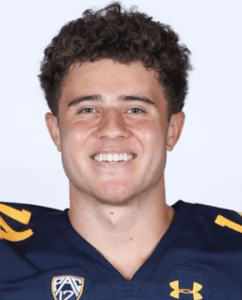
“He’s exploring the idea of turning professional,” said Shah, MBA 22, who earned a bachelor’s degree in sports management at the University of Texas at Austin, and worked with the football team there.
Whether or not Young makes it to the NFL, Shah is helping him map out everything from resume drafting to professional network building through a new mentoring program that matches MBA and law students with 20 Cal football players, one Cal women’s rower, and one Cal baseball player.
The program launched this month, a joint effort between the Haas Sports Business Club and the Cameron Institute, which serves as the Cal Athletics department for student-athlete development.
“An opportunity to create more interest”
Ben Adler, JD/MBA 21, who initiated the mentoring program as vice president of marketing for the Haas Sports Business Club, said his interest in mentoring athletes grew after he worked with Gabby Costamagna, BA 21, a member of the Cal women’s rowing team who was considering going to law school.
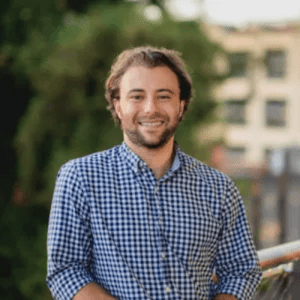
He also teamed with the Cal Athletics Department on a consulting project, part of which centered on the lack of graduate student engagement with Cal Athletics.
“Berkeley has thousands of graduate students who have allegiances to their undergraduate teams,” said Adler, who is partial to his own alma mater, University of Michigan. “We’re not as identified with Cal, so there was an opportunity to create more interest among grad students.”
One way of doing that, he thought, was connecting grad students directly to the athletes through a mentoring program. So through the Sports Business Club, Adler reached out to the Cameron Institute.
Bineti Vitta, the Cameron Institute’s director of career development, said they were immediately interested because mentoring aligns with the Institute’s career development pillar.
Piloting the program with student-athletes made sense, she added, as a common mindset among high-profile teams is centered around going pro. Yet in 2020, only 1.6% of NCAA football players were drafted to go professional. If players don’t go pro, they are often challenged with finding an identity outside of sports. “They love their sport and can’t even imagine there’s something that they could love equally,” Vitta said.
They love their sport and can’t even imagine there’s something that they could love equally, – the Cameron Institute’s Bineti Vitta.
Exploring and refining a career path
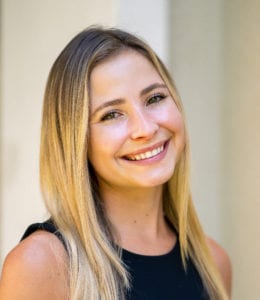
During five hour-long sessions with mentors, athletes explore various career paths based on their interests, begin to build resumes, and discuss ways to frame their experiences as leaders.
Kendall Stuscavage, MBA/MPH 22, who ran Division 1 cross-country for Cal as an undergraduate, is mentoring Cal cornerback Josh Drayden. Drayden’s top choice is the NFL, but the two have discussed alternate plans—including work in sports management or coaching, or maybe entrepreneurship. “I am helping him to explore and refine that path,” she said.

Drayden called the mentoring program “a great tool for the student athletes here.” “I look forward to working with Kendall more,” he said.
Stuscavage said that the mentoring program is rewarding personally, and also provided an opportunity for her to stay involved with the Cal sports community. “I grew up in the Bay Area and was a Cal Bears fan since I could say the words, “Go Bears,” she said. “As a lifelong athlete, sports are my passion.”
When Adler graduates this spring, he’ll hand off the mentoring program to Stuscavage and Shah. He said he hopes they will expand the pilot to other Cal sports programs, and recruit graduate students from beyond the business and law schools as mentors to expand the career scope of mentorship.
“We would love to expand the mentorship program and the relationship between Haas and other professional schools on campus,” Shah said. “We have high hopes beyond this to create something that is sustainable.”
US News ranks all three Berkeley MBA Programs in top 10
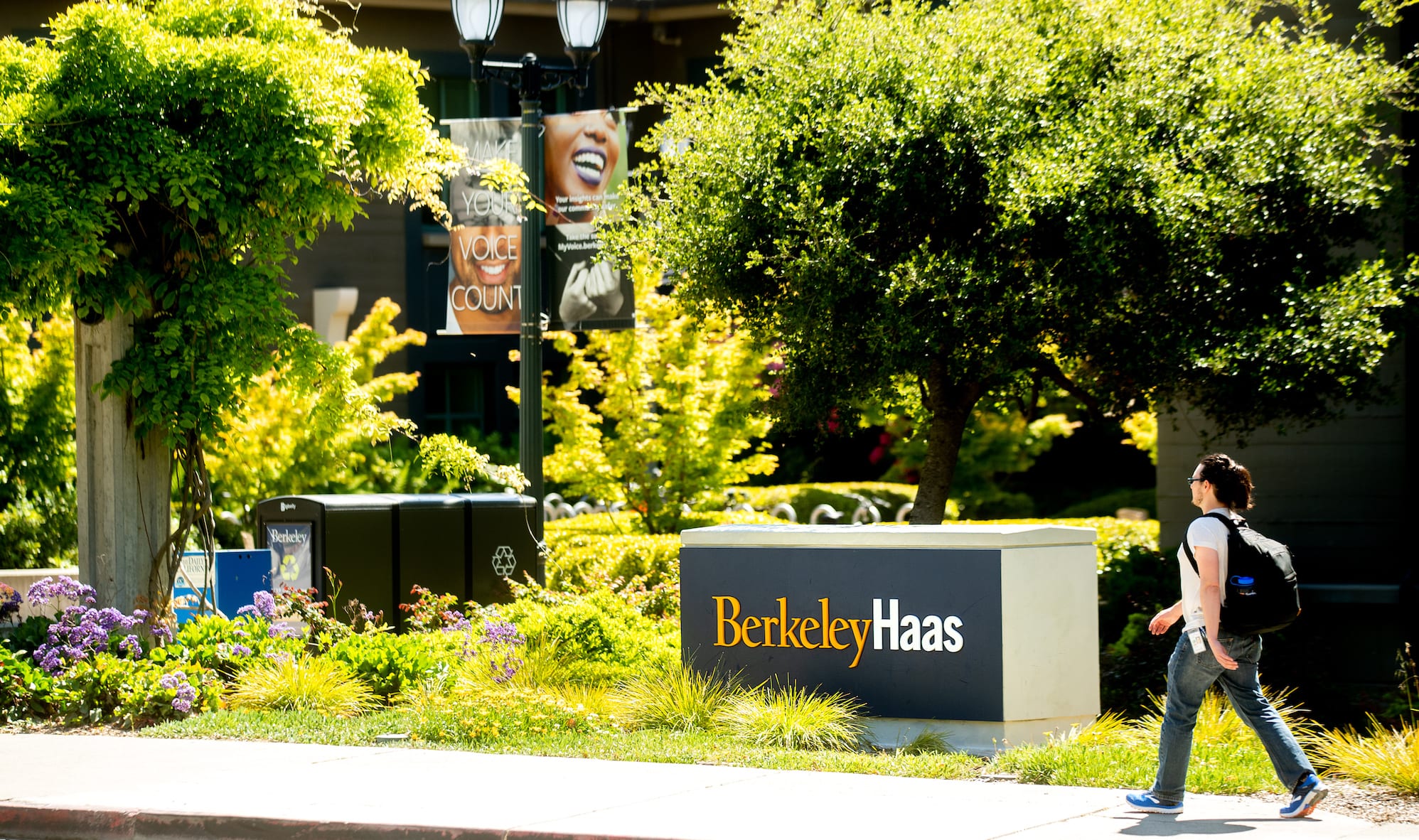
The Berkeley Haas Full-time MBA Program ranked #7 and the Evening & Weekend MBA Program ranked #2 among part-time programs again in the US News & World Report, released today. The Berkeley MBA for Executives ranked #8 among executive MBA Programs.
In the top 10 specialty rankings, Haas placed:
#9 in International (tied with Saint Louis University–Chaifetz)
The full-time MBA rankings are based on data provided by participating U.S. schools and on polls of business school deans and directors of accredited MBA programs, as well as surveys of corporate recruiters and company contacts. The score is calculated from placement success and starting salary (35%), student selectivity (25%), a peer poll (25%), and the average of the last three years of recruiter polls (15%).
Part-time MBA rankings are based on data from participating schools and on polls of business school deans and directors of accredited part-time programs. The score is calculated from the peer polls (50%), student selectivity (27.5%), work experience (10%), and percent of MBA students who are enrolled part-time (12.5.).
The specialty and the executive MBA rankings are based entirely on polls of business school deans and directors of accredited MBA programs.
The EWMBA ranked #2 for the third year in a row. The Full-time MBA ranked #7 for 13 of the last 14 years. The Berkeley MBA for Executives ranked #7 for the last two years.
View the full report here. (log-in may be required).
Design challenge offers crash course in corporate social responsibility in tech
A team of MBA students and alumni is organizing a new social impact challenge designed to give students a crash course in corporate social responsibility (CSR) in the tech industry.
The first annual Social Impact in Tech Design Challenge, co-hosted by the Haas Tech club and Net Impact club, will be held virtually April 1.
Students interested in signing up for the three-hour challenge will receive an introduction to the history, theory, and practice of corporate social responsibility in tech, network with professionals in the field, and design a CSR program for one of the tech companies participating in the challenge.
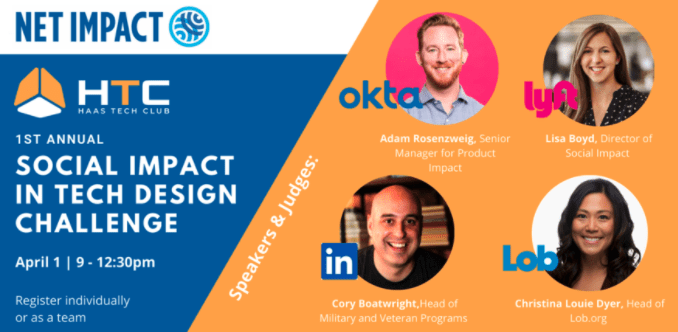 Challenge organizers include Joseph Zhang, Shotaro Ishizuka, Nicole Austin-Thomas, all MBA 21; Neha Dutta, Melody Liao, Stu Fram, all MBA 22; Scott Blons, EWMBA 23; and Adam Rosenzweig, EMBA 19, a Haas lecturer teaching Introduction to the Case Method and Red Teaming in both the EMBA and Full-time MBA programs.
Challenge organizers include Joseph Zhang, Shotaro Ishizuka, Nicole Austin-Thomas, all MBA 21; Neha Dutta, Melody Liao, Stu Fram, all MBA 22; Scott Blons, EWMBA 23; and Adam Rosenzweig, EMBA 19, a Haas lecturer teaching Introduction to the Case Method and Red Teaming in both the EMBA and Full-time MBA programs.
The challenge came about after club leaders from the Tech and Net Impact clubs–Michelle Poon, Priscilla Luu, and Joseph Zhang, all MBA 21–met with Adam Rosenzweig who spoke about his social impact work at Okta during a Haas career night.
After meeting for several weeks, the group decided to organize a social impact challenge that would focus on the intersection of tech and corporate social responsibility–two of Haas’ strengths.
“Every company is becoming a tech company,” said Rosenzweig. “And Haas students go on to lead companies that aspire to make the world a better place.”
Participants will explore the relationship between businesses and their communities and the ways in which business leaders can create positive social impact that’s aligned with their company’s core strategy.
Joseph Zhang said he hopes students will learn that CSR is a vital and growing career field and that it must be “ingrained within the DNA of an organization if the organization truly wants to be successful.”
Zhang, who previously worked for educational nonprofit iMentor, said the most meaningful corporate partners he worked with weren’t just “check-writers or one-time volunteers, but the companies that pulled resources from across the organization to impact their communities.”
Rosenzweig, a senior manager for product impact at Okta, will facilitate the event and serve as a guest judge. Other judges for the challenge include Cory Boatwright, EMBA 21, head of military and veteran programs at LinkedIn; Lisa Boyd, director of social impact at Lyft; Christina Louie Dyer, head of social impact at Lob; Nora Silver and Cristy Johnston Límon from the Center for Social Sector Leadership at Haas.
If the challenge is a success, Rosenzweig said he hopes it will demonstrate demand to pilot a credit-bearing elective course, adding to the broad list of course offerings dedicated to social impact and sustainability.
About 30 students have registered for the event, which is nearly at capacity, but current students can still register for the Social Impact in Tech Design Challenge here.
Student-led StEP fills critical gap for campus startups
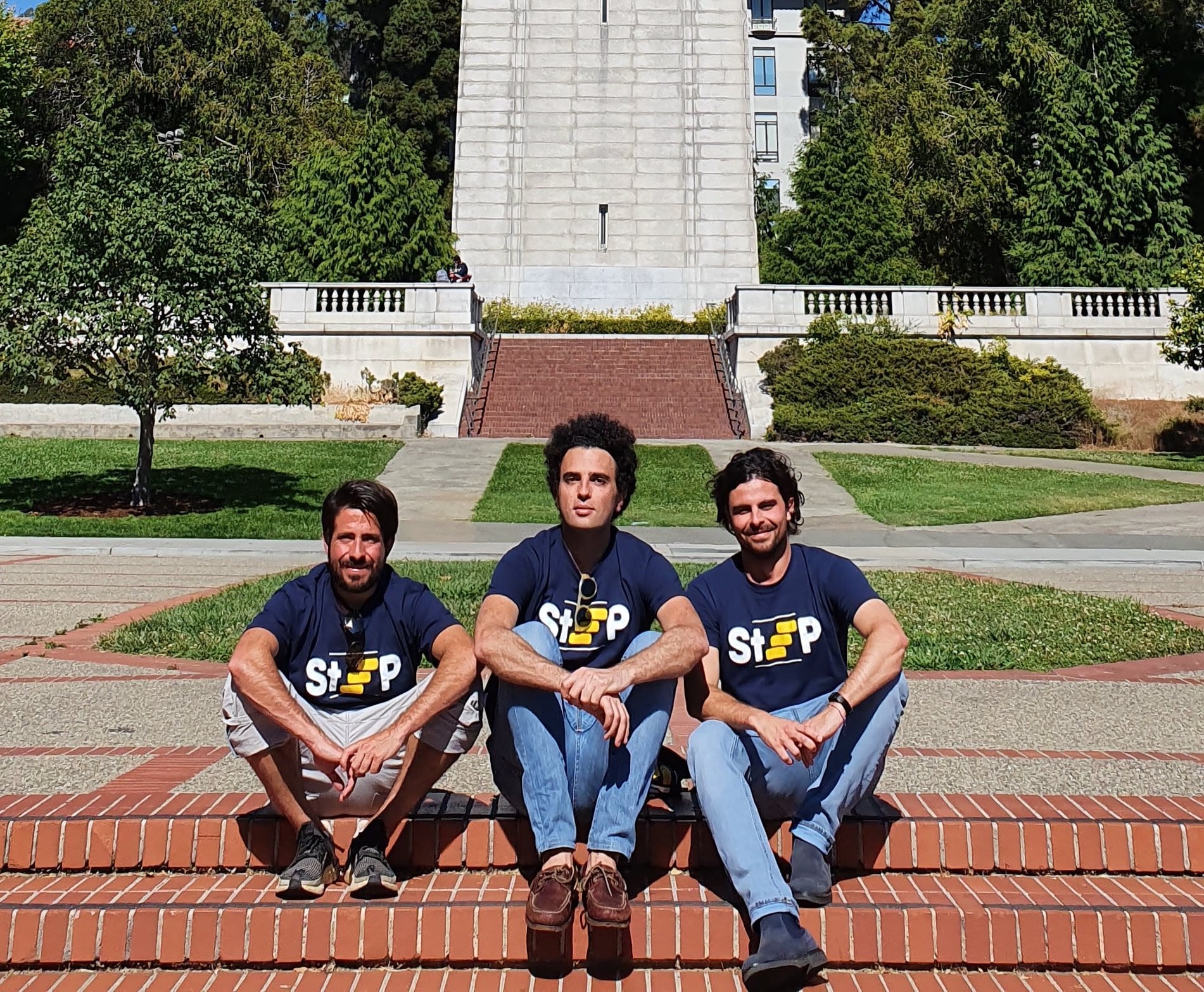
When Santiago Pezzoni isn’t in his Berkeley Haas MBA classes, he’s running his fintech startup, Digiventures.
And when he’s not running Digiventures, he’s helping other UC Berkeley students start their own companies as co-founder and program manager of StEP (Student Entrepreneurship Program), a 10-week campus-wide incubator that has so far assisted 120 startups.
“There are so many people on campus—PhDs, postdocs, engineers—who have fantastic ideas and technologies, but you ask them ‘how will you make that a business?’ and they say, ‘I’m not sure,’” said Pezzoni, MBA 21, who co-founded StEP with Santiago Freyria and Francesco Dipierro, both MBA 20. “We’re figuring out how to get them involved and help them take their fantastic ideas into the world.”
Launched in 2019, StEP is a cross-collaboration among Berkeley student clubs, faculty, entrepreneurship organizations, and VCs. It aims to fill a gap the founders discovered in the campus startup ecosystem.
“Our research found that while more than 80% of Haas students we interviewed took entrepreneurship classes or had startup ideas, less than 5% were able to access accelerators or pre-seed funding,” Pezzoni said.
“Our research found that while more than 80% of Haas students we interviewed took entrepreneurship classes or had startup ideas, less than 5% were able to access accelerators or pre-seed funding.” — Santiago Pezzoni.
Berkeley students, faculty or alumni can apply to StEP as teams or individuals, and opt to be matched with others. All of the teams meet on Zoom weekly, using skills they learn in StEP to take their ideas forward. They also meet separately each week with mentors to review goals and achievements. At the end of the program, teams pitch their startup plans to investors.
StEP applicants choose one of two paths, depending on whether they are looking for help with an idea or want to be matched with others who already have an idea. The program’s founders reach across programs and schools to find people with the right skill sets needed by the new teams. Later, the founders work to connect the teams with investors who can provide early-stage capital.
“You only do it if you really love this”
So far, 120 startups have completed the StEP program, and 30% of them still exist. About a quarter of participants are from Haas, including Dispatch Goods, founded by Lindsey Hoell, who was last year’s StEP showcase winner and is now growing her company at UC Berkeley SkyDeck, a partnership among Haas, Berkeley Engineering, and the Office of the Vice Chancellor for Research.
Pezzoni, who won the LAUNCH program last year with Digiventures, said StEP helps students to clarify whether the startup life is for them. “Being an entrepreneur is not a sexy life,” he said. “It’s tough, and you only do it if you really love this. You have to decide why you want to be a founder.”
“Being an entrepreneur is not a sexy life,” he said. “It’s tough, and you only do it if you really love this. You have to decide why you want to be a founder.”
StEP’s founders say they work about 20 hours a week apiece on the program, chatting often with startup stakeholders across campus including Rhonda Shrader, executive director of the Berkeley Haas Entrepreneurship Program (BHEP), Caroline Winnett, executive director of Berkeley SkyDeck, and former Haas Dean Rich Lyons, now UC Berkeley’s Chief Innovation and Entrepreneurship Officer, who supported StEP from its inception.
Moving through the startup ecosystem
The typical trajectory for new startup teams is to start with a program like StEP and continue with a Berkeley program like NSF I-Corps , CITRIS Foundry, Form+Fund, and then, with that experience under their belts, apply to the LAUNCH incubator program. María del Mar Londoño, MBA 21, founder of SuperPetfoods, won the StEP finals two years ago and continued on to the LAUNCH finals. StEP co-founder Freyria also went through LAUNCH as a co-founder of Callisto Spirits, a botanical rum maker that raised $650,000.
Bernardo Magnani, MBA 21, who is part of the StEP leadership team, left a consulting career to co-found Lastbit, and was accepted to the prestigious Y Combinator startup accelerator program. Magnani just raised $2 million for the company, which allows customers to make instant low-cost global Bitcoin payments.
“I’m such a fan of StEP,” Shrader said. “Sometimes the hardest part of entrepreneurship is just finding a teammate or asking a bunch of questions with people who are all learning together. StEP is just a beautiful resource for the campus—designed and delivered by students.”
The passion to keep building the program unites the StEP team, Dipierro said.
“We’re working to build something that will continue, that can be sustainable at UC Berkeley for the next 10 years,” he said.
Reflection, risk, and reward in social impact for Katrina Gordon, MBA 17
Preparing women to lead in a post-pandemic world

Equipping women with the skills to bounce back as strong leaders in the wake of the COVID-19 pandemic will be the focus of the 25th annual Berkeley Haas Women in Leadership (WIL) conference next month.
Nearly 2.3 million women have dropped out of the workforce since the start of the pandemic, according to the U.S. Bureau of Labor Statistics. On top of that, the pandemic has illuminated deeply-rooted gender equity, class, and racial injustice issues in the U.S.
To prepare women to emerge stronger from the crisis, the WIL leadership team quickly decided that this year’s theme would be “New Leadership for a New World.” The conference will be held March 4-5.
“We’re living in a totally different world now and there are brand new roles for everybody to play, especially for women,” said conference Co-chair, Maggie O’Neill, MBA 21. “From Jacinda Ardern to Stacey Abrams, this past year has revealed women leaders in a new light and we want to build on this momentum and help create a stronger, more inclusive definition of leadership.”
The WIL conference, one of the longest-running and most well-attended events at Berkeley Haas, brings together students, scholars, entrepreneurs, and corporate executives from Silicon Valley and beyond. Organized by the Women in Leadership club, the conference will be held during two half-days online.
Conference organizers include Maggie O’Neill, Chyi-Shin Shu, Sadie Shelton, Nicole Austin-Thomas, Rebeca West, Marina Mamer, all MBA 21; Gina Deitz, Julie Reynolds, and Sitara Chandra, all MBA/MPH 21.
More than 250 people have registered for the conference, which will focus on celebrating pioneering women leaders, making an impact in local communities and beyond, and learning leadership skills for professional success.
The team invited poets, activists, and journalists to lead panel discussions alongside executives and entrepreneurs. The idea was to expand the lens of who is a leader, said Nicole Austin-Thomas, MBA 21.
Laila Tarraf, MBA 97, chief people officer at Allbirds, will kick off the conference with a keynote, followed by a story salon, a fireside chat, and a virtual wine tasting event for WIL members.
Dean Ann Harrison will open Friday’s sessions, followed by a keynote address from diversity consultant Mikki Kendall; a panel discussion led by Kellie McElhaney, executive director of the Center for Equity, Gender, and Leadership at Haas; a networking lunch; a fireside chat with poet and activist Cleo Wade; and breakout sessions focused on allyship and advocacy, authentic authorship, and building equitable outcomes.
Other notable guest speakers include Elena Gomez, BS 91, CFO of Zendesk; Vrinda Gupta, MBA 20, founder and CEO of Sequin Financial; Monique Shields, a Berkeley Haas career coach and founder of career coaching company Seven Pines Leadership; and Archana Gilravni, vice president of partnerships at the Sheryl Sandberg and Dave Goldberg Family Foundation.
Conference tickets are available here.
These Haas couples found love in a pandemic
Finding love in ordinary times is hard enough. In honor of Valentine’s Day, we talked to two Berkeley Haas couples—Jerry Qinghui Yu and Camilla Guo, both MFE 21, and Gary Yin and Aileen Lu, both MBA 22—who found love during a pandemic. Here are their stories.

When Jerry Qinghui Yu and Camilla Guo, MFE 21, found love in their class of 96 Master of Financial Engineering (MFE) students, it wasn’t a secret for long.
“The program is small, so news travels fast,” said Jerry, who met Camilla at the start of the year-long MFE course.
They shared a sense of humor and similar childhood experiences in China. They both love a good pun, too, particularly if it’s cross-cultural. And Camilla is passing on her passion for cooking to Jerry, who texts photos when he masters one of her complicated recipes.
Ask the pair who is smarter, he’ll swear that she is. Linda Kreitzman, executive director of the MFE program, agreed, but added that “they’re both brilliant and they’re fun together.”
“Jerry is very serious and Camilla really draws out that fun side of him,” she said. “He’s been funnier since he’s been with her.”
Jerry is very serious and Camilla really draws out that fun side of him. — MFE Executive Director Linda Kreitzman
The couple, who became avid local hikers since arriving in Berkeley, plans a road trip for Valentine’s Day, to California’s Lassen Volcanic National Park or maybe Yosemite. “We bought hiking shoes for the hills,” Camilla said. “We love to hike when we’re not busy.”
Next up, Jerry, who earned an undergraduate degree in financial economics, computer science, and mathematics from the University of Toronto before coming to Haas, will head to Boston where he’s landed a job at an asset management company.
Camilla, who holds an undergraduate degree in industrial engineering from Tsinghua University and has worked in derivatives and cross-asset structuring, plans to join him there after graduation in March.
During such a rigorous academic program, only complicated by the stress of the pandemic, it’s nice to have each other, Guo said.
“Since we are in the MFE he understands what I’m learning and we have more to share,” she said. “I don’t have to explain a lot. With friends, I sometimes have to share the background of things. With Jerry I can tell him how I feel right away.”
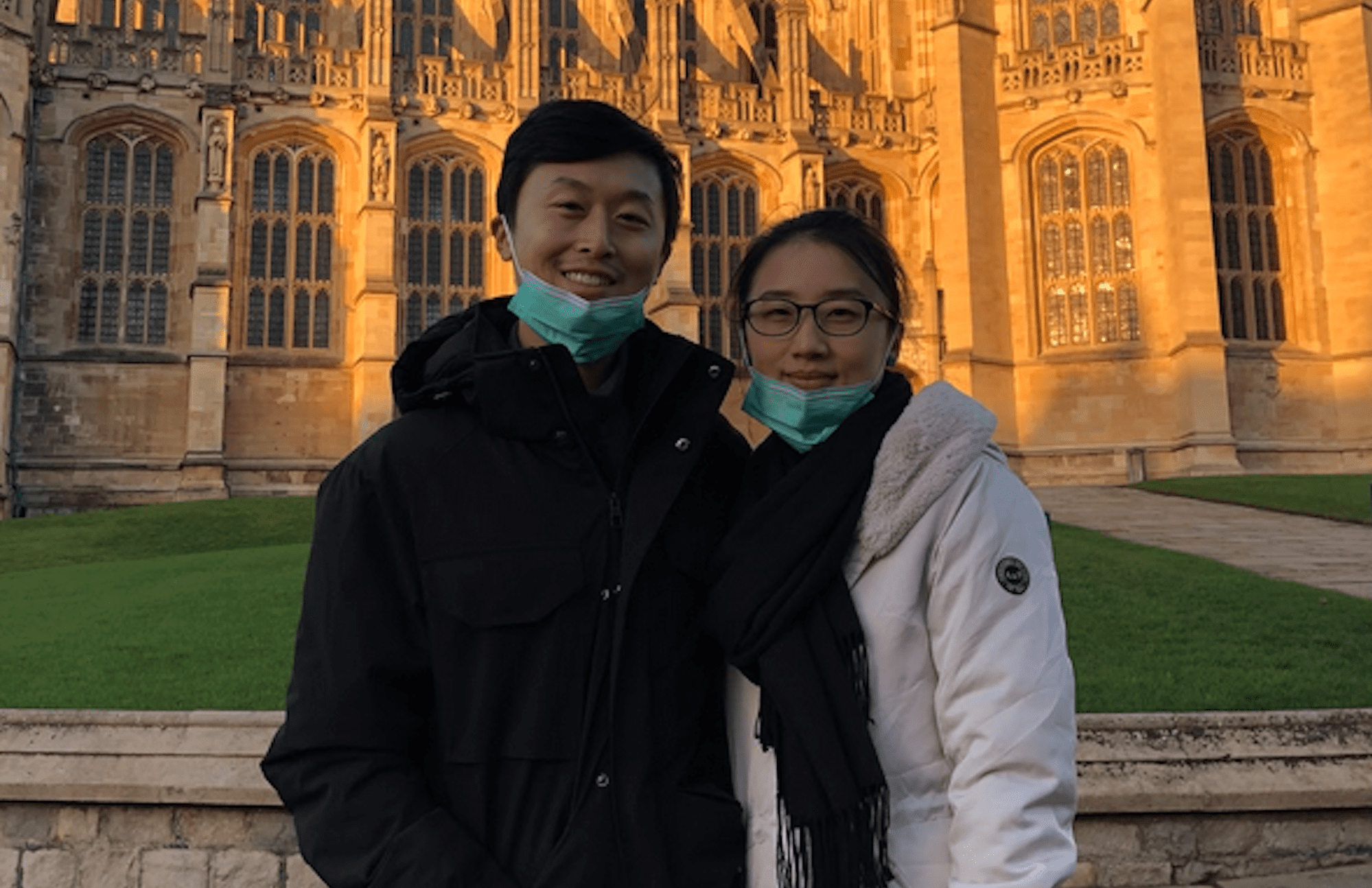
For Gary Yin, MBA 22, finding love during a pandemic was about taking a leap of faith—and getting on a plane.
Gary met Aileen Lu, MBA 22, in September 2020, when both volunteered as moderators during the virtual Berkeley China Summit. Gary was in Berkeley at the time, and Aileen was 16 hours ahead in Shanghai, waiting for a visa to fly to the U.S. and join her classmates.
The pair got to know each other during a conference on entrepreneurship, a shared passion. Both had started education-related companies before enrolling at Haas and had plans to continue working in the startup world.
Gary, who was born in China and grew up outside of Chicago, got to know Aileen in their shared cohort, chatting constantly on Slack and Zoom. But they both thought there might be more to their relationship.
“I found Gary to be a pretty genuine person and when we talked it was natural to open up and share personal stories,” Aileen said.
“The best part of my day was Slacking with her,” Gary said.
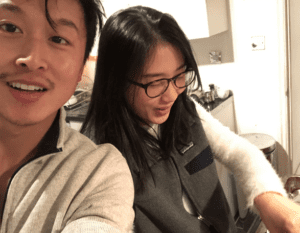
As the weeks passed, Aileen, who earned an undergraduate economics degree at Berkeley in 2015, was still unable to get a visa. Frustrated by the closing of the U.S. Embassy in China, she decided to fly to London to try to get a visa there. Surprisingly, Gary offered to meet up with her, and he boarded a plane out of San Francisco with just five other international travelers.
“I thought ‘If Aileen doesn’t get the visa, this might be my one chance to see her during the pandemic,’” Gary said.
“We both took a leap of faith after knowing each other for two months,” Aileen said.
Over three weeks during the holiday break, they met up with friends and explored London. Since Britain’s coronavirus rules weren’t strict at the time, the couple were able to explore places like Windsor Castle and enjoy the holiday lights throughout the city.
When Aileen’s visa finally came through, the couple flew back to California together. They’ve been together since, living a few blocks apart in downtown Berkeley.
Starting out in two countries
Both are deeply involved in entrepreneurship at Haas. Aileen co-chairs the Berkeley LAUNCH accelerator and is working with Berkeley Female Founders, a campus group that brings founders and funders together. Gary is a Pear VC fellow and co-runs the Haas Startup Squad, a group that helps match Haas students to startups at Skydeck, UC Berkeley’s incubator program. He also organizes Startup Marketplace, a program that connects UC Berkeley grad students with top faculty and researchers for National I-Corps projects.
In their free time, the couple enjoys walking the campus, Aileen pointing out the buildings that have changed since she was an undergraduate. “All of our friends have found it pretty amazing that we’re together,” Gary said. “Things have worked out even though we started in two different countries and met in a third. We’re really grateful for that.”
Haas Healthcare Conference to explore COVID-19 response, racial equity
Innovative COVID-19 testing methods, digital options for mental health treatment, and racial equity challenges in healthcare are among the topics to be explored during the 2021 Haas Healthcare Association Conference.
With a theme of “Finding New Breath: Emerging Stronger Through Health Crises,” the 14th Annual Haas Healthcare Association Conference will be held online from Feb. 22-24. The conference, typically held at UCSF Mission Bay on a Friday, will span three half-days.
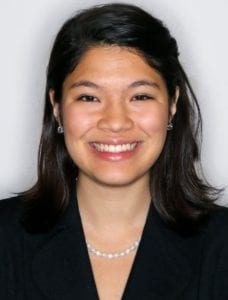
This year’s theme is a nod to the many challenges that have impacted breathing over the past year—from the COVID-19 pandemic to rampant wildfires, said conference co-chair Corrine Marquardt, MBA/MPH 21. “2020 was so hard, with many challenges focused around mental and physical health, so we wanted this year to be about resilience and coming through stronger than we were pre-crises,” she said. “We also wanted to address how tech and innovation can help get us through our health challenges.”
Each day will focus on a different theme, including health and environmental equity, (day one) COVID-19 & pandemic response, (day two) and health technology & innovation (day three). A career networking night is planned on Monday, Feb. 22, from 4-5 pm.
“We have a lot of ground to cover over three days and we’ve brought together some of the brightest minds in this space to reflect on everything from racial injustice in healthcare to vaccine development and distribution challenges,” said conference co-chair Ben Delikat, MBA/MPH 21.
Berkeley Haas Dean Ann Harrison and Michael Lu, Dean of UC Berkeley’s School of Public Health, will welcome attendees to the conference, which includes many guests from across the UC Berkeley campus.
We wanted this year to be about resilience and coming through stronger than we were pre-crises. —Corrine Marquardt.
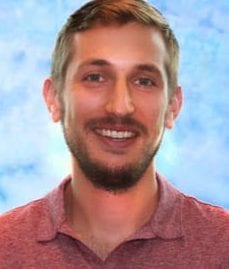
Monday’s line-up includes Dr. Alice Chen, Chief Medical Officer for Covered California, as well as two panels on health equity, one focused on health equity implications of COVID-19 and the other focused on addressing social determinants of health through payers and providers.
Tuesday session highlights include a climate-change focused conversation with Kristine Belesova, deputy director of the Centre on Climate Change and Planetary Health at the London School of Hygiene, along with a COVID-19-focused conversation with Niranjan Bose, managing director of Health & Life Sciences Strategy at Gates Ventures.
Dr. Guy Nicolette, assistant vice chancellor, University Health Services (UHS) of UC Berkeley will join Dr. Anna Harte, UHS Medical Director of UC Berkeley, for a panel discussion with Othman Laraki CEO of genetic test company Color Genomics about public/private partnerships in addressing COVID-19.
On Wednesday, Alice Raia of KP Digital and Kim MacPherson, executive director of Health Management at Haas, will discuss recent digital transformation trends in health systems. The day also includes a conversation on how technology has enabled global health endeavors through COVID-19, as well as a panel on how technology solutions are being used to address mental health. Mariya Filipova, co-founder of the XPRIZE Pandemic Alliance and Anthem’s former vice president of innovation, will close the conference in conversation with Marquardt.
Business leaders from organizations including Google, Jazz Ventures, Headspace, Accenture, Vida Health, and UCSF will participate.
The conference is open to the public. Tickets are available here.
2021 BERC Summit to focus on climate change, clean energy, jobs
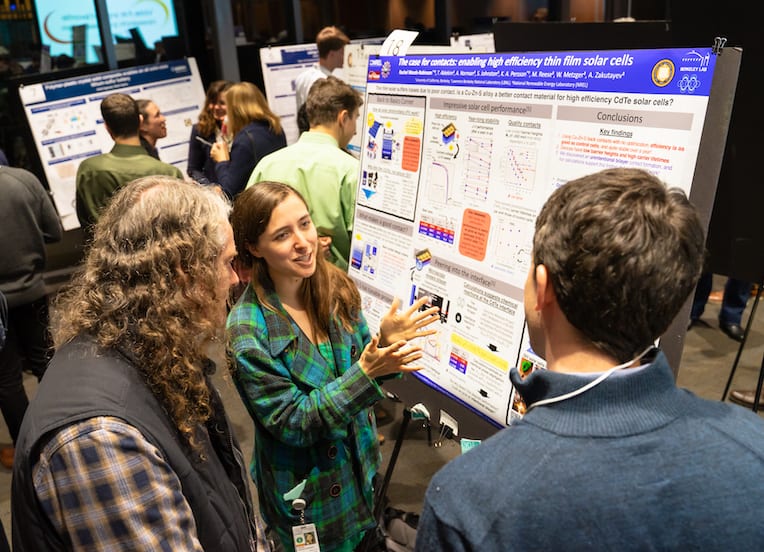
Investing in clean energy, reducing CO2 emissions, and boosting the U.S. economy through cleantech innovations will be the focus of the 15th annual BERC Energy Summit.
“Energizing the Recovery” is the theme of this year’s summit, which brings together policymakers, researchers, innovators, industry experts, and graduate and undergraduate students from across the UC Berkeley campus. The conference, organized by the student-run Berkeley Energy and Resources Collaborative (BERC), will be held virtually Feb. 10-12.
Nearly 500 people have registered for the summit, which kicks off Wednesday with a career fair for undergraduate students followed by an Innovation Expo, a student-research exhibition, and a Career Forum for graduate students, allowing them to network with leading energy and cleantech companies, including Chevron, Southern California Edison, and Terabase.
Thursday and Friday will offer networking opportunities, fireside chats, and panel discussions ranging from reimagining mass transit to creating “green” jobs to proposing state and federal legislation that addresses climate change.
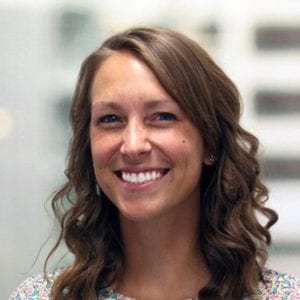
Keynote speaker Kate Gordon, senior climate advisor to Gov. Gavin Newsom and director of the Governor’s Office of Planning and Research, joins a list of notable guest speakers including California State Senator Henry Stern, chair of the Senate Natural Resources & Water committee; Vanessa Miler-Fels, director of Energy Innovation and Impact at Microsoft; and Arthur Bart-Williams, executive director of GRID Alternatives, an organization that installs solar panels in low-income communities.
Despite not being able to gather on campus, conference organizers are hoping to replicate the “in-person” environment through Remo, a virtual conference platform, said Anne Hemmelgarn, MBA 21, one of nine graduate students organizing the BERC summit.
With Remo, attendees can “walk” into a networking room, “sit” at any of the tables that seat two to six people, and have one-on-one conversations at any time during the conference. They can also click on attendees’ icons and instantly view their LinkedIn profiles, which will pop up on the screen.
“We think our guests will really love our set-up,” Hemmelgarn said.
Conference tickets are available here. All proceeds will go to BERC’s local non-profit partners: GRID Alternatives, California Environmental Justice Alliance, and the Local Clean Energy Alliance.
Prof. Adair Morse joins Biden administration as a treasury department deputy
Adair Morse, an associate professor of finance at the Haas School of Business, has been named to the Biden Administration’s treasury department as deputy assistant secretary of capital access in the Office of Domestic Finance.
The U.S. Department of the Treasury, led by Prof. Emeritus Janet Yellen, announced the appointment today.
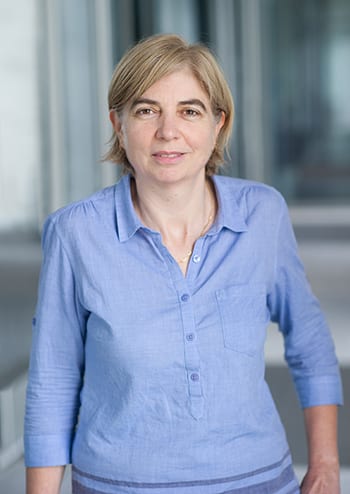
“I’m thrilled to have the opportunity to serve in the Biden Administration and to join the team at treasury, serving the people of this great country,” said Morse, the Soloman P. Lee Chair in Business Ethics, who is taking a leave from the Haas Finance Group to commit to her new role.
“We will miss Adair at Haas, where she has conducted groundbreaking finance research and launched the Sustainable and Impact Finance (SAIF) initiative with (former Haas Dean) Laura Tyson to train many new leaders in the field,” said Dean Ann Harrison. “She has already made an impact in helping small businesses in California through her work on the California Rebuilding Fund. I have no doubt she will have an even greater impact on a national scale.”
The Office of Domestic Finance develops policies and guidance in the areas of financial institutions, regulation, capital markets, and federal debt finance. Its community and economic development division coordinates small business finance and development, housing policy, capital access, and issues related to underserved communities.
Morse, who holds a PhD in finance from the University of Michigan’s Ross School and two master’s degrees from Purdue University, joined Haas in 2012 from the University of Chicago’s Booth School of Business. Her research interests include equity issues in financial services and algorithms, small business survival, sustainable investing, discrimination and corruption, venture capital, and pension management. The unifying theme in her work, she has said, is “leveling economic playing fields.”
“Adair’s groundbreaking research has looked at important issues, like small business survival in the city of Oakland, consumer lending discrimation in fintech, and the pervasiveness of corporate fraud,” said Prof. Catherine Wolfram, associate dean for Academic Affairs and chair of the faculty. “As a pioneering, creative thinker in so many areas, she will have plenty of opportunity to bring her financial and social impact leadership to the table.”
As a pioneering, creative thinker in so many areas, she will have plenty of opportunity to bring her financial and social impact leadership to the table. —Prof. Catherine Wolfram, chair of the faculty
Morse has spent much of the pandemic using her finance expertise to try to help small businesses. Last spring, Morse and Tyson began working on a strategy to use public capital to attract private lenders to provide low-interest credit to help vulnerable small businesses get through the crisis. They first helped develop a program with the City of Berkeley, and then worked with others—including Yellen, who was then on Gov. Newsom’s Task Force on Jobs and Competitiveness—to implement an innovative public-private loan structure at the state level. Their work helped launch the California Rebuilding Fund, run by the Governors’ Office of Business and Economic Development (GO-Biz) and aimed at some of the state’s smallest businesses in under-resourced communities.
At Berkeley Haas, Morse also ran the Haas Impact Fund and Sustainable Investment Fund curriculum, managing two endowment funds with Haas students. The Sustainable Investment Fund is the first and largest student-led Socially Responsible Investing (SRI) fund within a leading business school.Until recently, Morse served on the Governance and Allocations Committee of the California Rebuilding Fund, as well as on the expert panel for the Norwegian sovereign wealth fund, advising on issues of sustainability and innovation.
Berkeley Haas offers graduate certificate in sustainable business
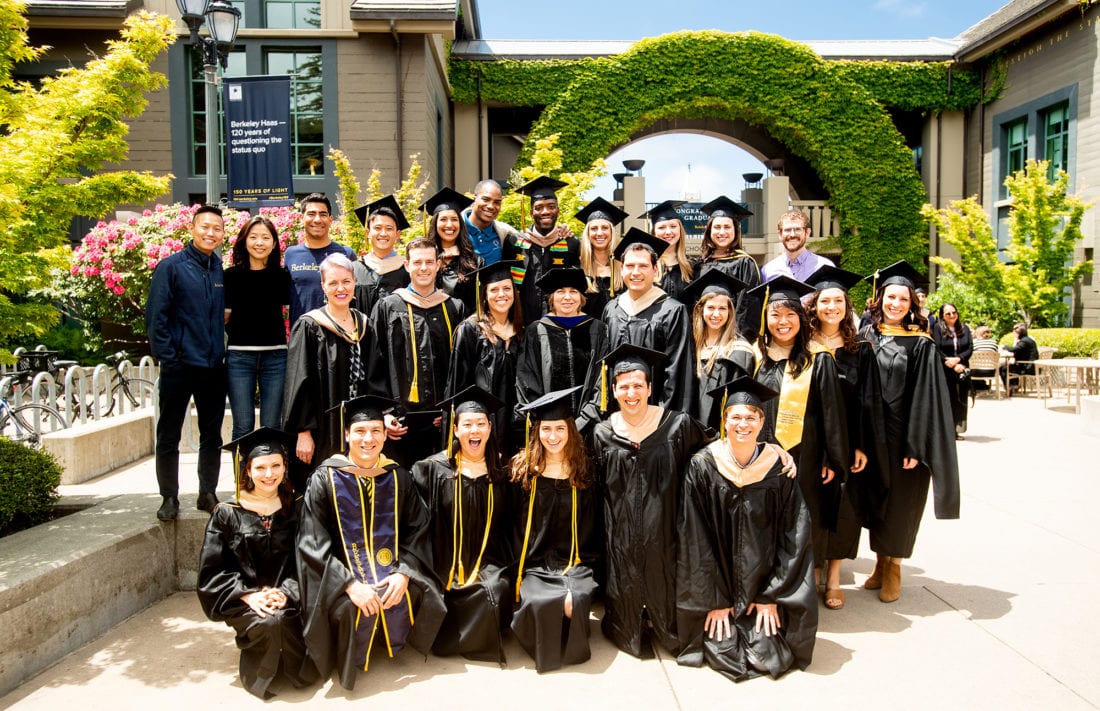
Berkeley Haas this week launched a new certificate that will equip MBA students to become sustainability leaders.
The Michaels Graduate Certificate in Sustainable Business is named in honor of the parents of Charlie Michaels, BS 78. Michaels, with his wife, Doris, gave $1 million to support the new certificate program, noting his parents’ commitment to the importance of values and business ethics.
Dean Ann Harrison called the new certificate an important addition for Haas. “We need to make sustainability an integral part of doing business,” Harrison said. “Future business leaders will need to design new models and financial structures, policies, and industry solutions to address the world’s most pressing sustainability challenges. The Michaels Graduate Certificate in Sustainable Business will train our students to evaluate operational, financial, and strategic decisions using a sustainability lens.”
We need to make sustainability an integral part of doing business. —Dean Ann Harrison.
The certificate, approved for rollout in the current spring semester, evolved from initiatives launched across campus by faculty and students who are passionate about both sustainability and social impact, said Michele de Nevers, executive director of sustainability programs at Haas.
“This new certificate addresses a pressing need to empower new leaders with the capacity to lead the economic and social transition to a climate resilient, low-carbon, and equitable future,” de Nevers said.
To earn the certificate, students are required to complete at least nine graduate-level units of approved courses drawn from electives in the existing MBA curriculum. Students must first take two foundational courses—Energy and Environmental Markets and Business and Sustainable Supply Chain—that introduce sustainability concepts critical to energy and the environment, natural resources, and supply chains.
They will then choose an in-depth course to dive deeper in a particular area, such as impact investing, entrepreneurship, clean tech, energy infrastructure, or food systems. The certification culminates with a final project that will focus on developing strategic and sustainable business solutions or bringing clean technology to market.
About 15 to 20 students are expected to complete the certificate within the first year, said Pete Johnson, assistant dean of the full-time MBA program and admissions.
De Nevers said the certificate will equip graduates to bring a sustainability perspective to their work across all types of organizations.
“We hope that they will see opportunities to create value across industry roles, whether it’s through increasing energy efficiency, eliminating waste in supply chains, or pursuing new business opportunities in clean technology,” she said.
For more information about the certificate click here.
Berkeley Haas remains strong in rankings
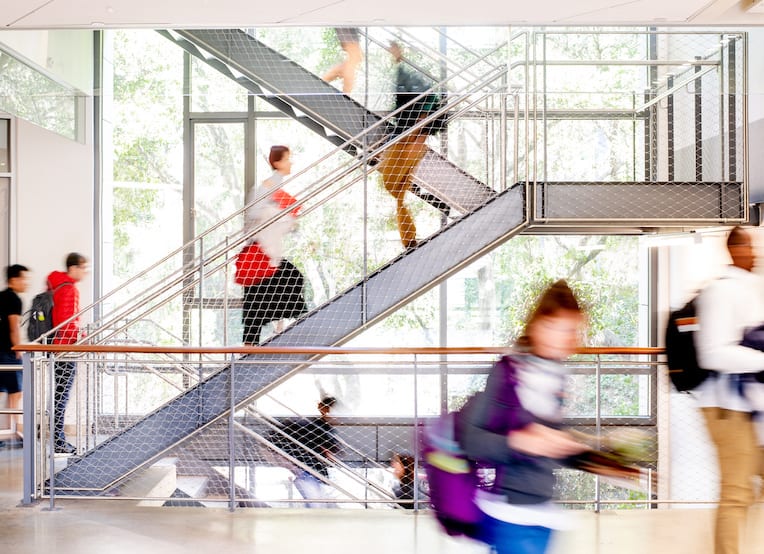
The Full-time MBA Program ranked #8 for the third year in a row in Poets & Quants’ meta ranking, published in December.
Poets&Quants’ ranking is based on five influential rankings published in U.S. News, The Financial Times, Bloomberg Businessweek, Forbes, and The Economist and combines them assigning weights based on Poets & Quants’ assessment of the soundness of each publication’s methodology.
Since Bloomberg Businessweek and The Economist did not publish rankings in 2020 due to the COVID-19 pandemic, there was little change in the results of this year’s P&Q ranking.
Among Financial Engineering Programs, the Berkeley Haas MFE recently ranked #5 in Risk.net.
The MFE program had an outstanding employment year in 2020 with just over 99% of the class placed and, at $115,132, earning the second-highest average starting salary of the programs being ranked, in spite enrolling the largest class of 96 students. With only 17% of the application pool accepted, Haas also ranked 4th in terms of the number of accepted students who enrolled.
Risk.net bases its ranking on 20% admissions, 10% ratio of industry-affiliated lecturers, 30% employment rate six months after graduation, 25% average starting salary, 5% faculty research based on the number of citations of the five most cited instructors in the past four years.
In comparison, Haas ranked #5 again in the 2021 Quantnet ranking that was published in November.
Startup Spotlight: EdVisorly eases transfer process for community college students

Startup Spotlight profiles startups founded by current Berkeley Haas students or recent alumni.
EdVisorly was co-founded by Manny Smith, MBA 21, a former product manager with the U.S. Air Force and a first-generation college student, and Alyson Isaacs, BS 21, who is tapping her experience as a former community college student to help fix the transfer process for the next generation. Smith is CEO and Isaacs serves as COO.
We recently interviewed Smith and Isaacs.
What does your startup do (in 20 words or less)? We help California community college students transfer to their target universities.
How did you meet?
Alyson Isaacs: Manny and I met by chance while waiting on line for coffee at Cafe Think during orientation week my first year at Haas. Manny had started the ideation process for the company and we talked about it. We’ve committed to this mission ever since. Manny has always been inspired by community college students and their grit. Being a first-gen student, he empathizes with what community college stands for, so our mission for this company is aligned.
Where did the idea come from?
Alyson Isaacs: I attended three community colleges before deciding on business at Haas—Chabot, Santa Barbara City College and Las Positas. There’s a discouraging problem that there are few reliable resources for community college students to help them transfer and few students who know how to access and use the resources. The academic counselors are overburdened and the COVID-19 remote learning environment has exacerbated these issues. Students get misinformation. Also, the four-year universities each have their own unique admission requirements, from courses to the process of applying. We are aggregating all of the information and insights a student would need to transfer to a four-year university and improving the student experience.
How does EdVisorly solve the problem in a new or different way?
Manny Smith: Of the 13.1 million community college students, who represent a third of all undergraduate students across the U.S., about 40% drop out per year. After interviewing more than 200 community college students, we uncovered big resource problems that are causing students to drop out. That’s what we aim to solve with EdVisorly. With our student-centric approach, we aim to positively disrupt higher education by providing a more clear path to university acceptance from community college. I compare our approach to the way GPS works— you tell us where you are, and we tell you what path or set of paths to take to reach your destination.
After interviewing more than 200 community college students, we uncovered big resource problems that are causing students to drop out. — Manny Smith
What’s been the biggest challenge for you so far?
Alyson Isaacs: The data side of things. We have millions of combinations of what classes meet the requirements for which majors and there are a lot of different subsets of that information. We are generating more accurate data every day to improve the quality of our student data experience.
Manny Smith: We are running a concierge service where we use the software to work directly with students while planning their academic journey. This is helping us learn more about the student’s wants, needs, and fears to ensure we have a product that both helps students and garners high adoption rates. We are in the process of hiring additional software engineers to augment the team and help us refactor our product.
What are your goals for the next six months?
Manny Smith: Over the next six months, we plan to help 250 students plan their journey from community college to four-year universities. By exercising an action-oriented, go-to-market strategy, we’ll be able to better understand unique student experiences, refine our marketing channels, validate our pricing model, and deliver a better product by summer 2021.
Has Haas helped with resources for your startup?
Manny Smith: The Haas Entrepreneurship ecosystem has truly been a game changer. The expert professors, mentors, incubator and accelerator programs are second to none. I would like to call special attention to the Hansoo Lee Fellowship (named after the late Hansoo Lee, MBA 10, and co-founder of Magoosh) which provided mentors and resources to allow me to pursue EdVisorly for my summer internship. Mentors such as Steven Horowitz from the Big Ideas Contest, helped us develop frameworks to think critically about the problem we aim to solve. Kurt Beyer, Rhonda Shrader, and Phillip Denny have been phenomenal in helping us navigate the right incubator and accelerator programs based on our startup progress.
Deferred MBA admissions program expanded beyond UC Berkeley
Berkeley Haas is expanding its Accelerated Access program, allowing all undergraduate seniors or final-year graduate students to apply for deferred admittance to the full-time MBA program.
Haas first piloted the Accelerated Access program in January 2020, limiting it to UC Berkeley students. The pilot’s success led to an expansion of the program to a wider variety of applicants, said Eric Askins, executive director of full-time MBA admissions.
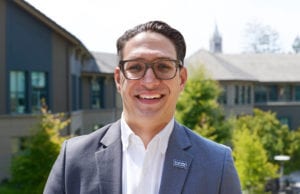
“We wanted to provide a new opportunity for young professionals who are planning to make an impact earlier in their careers through earning an MBA,” Askins said. “Deferred admission is the perfect option for many of these students, and we’re looking forward to meeting them.”
Under the program, undergraduate and master’s students apply to the MBA program during their final year. Successful applicants gain conditional admission, and can then enroll after a flexible two-to-five-year deferment period during which they gain professional experience, which is typically required for all traditional MBA candidates.
The program allows students to “do work that aligns with their passions with the reassurance that they will be able to return to a top-ranked MBA program within a few years,” Askins said.
The program is expected to increase the diversity of the class, he said, encouraging more international students and students from a wide variety of academic disciplines to consider an MBA—from graduate students in environmental science who want to pursue careers in sustainability to engineering students who want to complement their technical skills with a business foundation.
Askins added that the program enables the admissions office to get to know potential applicants earlier in the process, when they are planning their careers, deepening their academic passions, and considering an MBA.
Admitted applicants can join a Slack community, to meet other deferring students who want to stay on top of the admission process and connect with future peers.
Students will check in annually during the deferral period with admissions to make sure that they are on track and supported, Askins said.
The first deadline for applicants is April 5. The application process is similar to that of the full-time MBA program, with requirements that include a resume, two letters of recommendation, two short essays, undergraduate transcripts, and either the GMAT or GRE standardized test. An interview will be required for admission.
While these applicants will not be able to tap into work experience on their applications, they have much to offer, Askins said. “We’re looking for strong academic indicators paired with clarity of purpose. If you know an MBA will be useful in your future goals, it means you’ve thought about a plan. We are looking for clarity on that plan.”